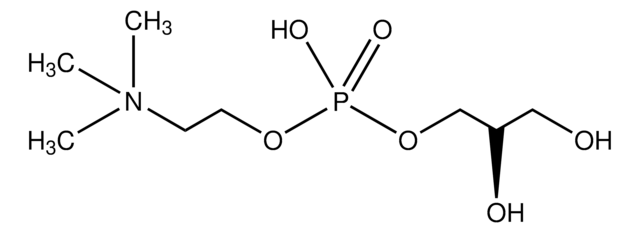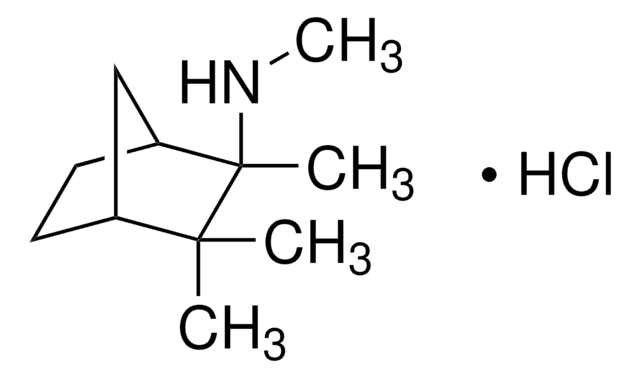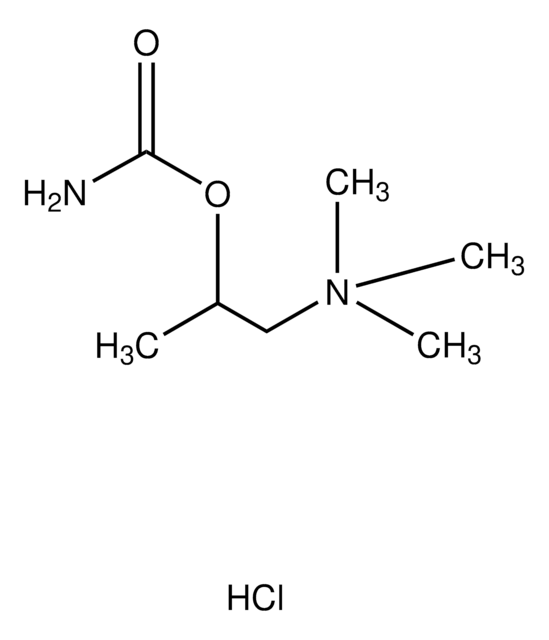C5366
Chlorisondamine diiodide
≥98% (HPLC), white, solid
Synonym(e):
4,5,6,7-Tetrachloro-2,3-dihydro-2-methyl-2-[2-(trimethylammonio)ethyl]-2H-isoindolium diiodide
About This Item
Empfohlene Produkte
Assay
≥98% (HPLC)
Form
solid
Lagerbedingungen
protect from light
Farbe
white
Löslichkeit
H2O: ≥2 mg/mL
DMSO: >20 mg/mL
Lagertemp.
2-8°C
SMILES String
[I-].[I-].C[N+](C)(C)CC[N+]1(C)Cc2c(Cl)c(Cl)c(Cl)c(Cl)c2C1
InChI
1S/C14H20Cl4N2.2HI/c1-19(2,3)5-6-20(4)7-9-10(8-20)12(16)14(18)13(17)11(9)15;;/h5-8H2,1-4H3;2*1H/q+2;;/p-2
InChIKey
FPNVAOZHQUJJJQ-UHFFFAOYSA-L
Anwendung
- as a nicotinic receptor antagonist to test its effect on trinitrobenzene sulfonic acid (TNBS)-induced colitis
- as an irreversible nicotinic acetylcholine(nAChR) blocker to pre-treat brain samples to test its effect on cytochrome P450 2B (CYP2B) induction
- as a ganglionic blocker to test its effect on regulating corticosterone levels in rat with chronic stress
Biochem./physiol. Wirkung
Leistungsmerkmale und Vorteile
Signalwort
Warning
H-Sätze
P-Sätze
Gefahreneinstufungen
Acute Tox. 4 Oral - Aquatic Acute 1
Lagerklassenschlüssel
11 - Combustible Solids
WGK
WGK 2
Flammpunkt (°F)
Not applicable
Flammpunkt (°C)
Not applicable
Persönliche Schutzausrüstung
dust mask type N95 (US), Eyeshields, Gloves
Analysenzertifikate (COA)
Suchen Sie nach Analysenzertifikate (COA), indem Sie die Lot-/Chargennummer des Produkts eingeben. Lot- und Chargennummern sind auf dem Produktetikett hinter den Wörtern ‘Lot’ oder ‘Batch’ (Lot oder Charge) zu finden.
Besitzen Sie dieses Produkt bereits?
In der Dokumentenbibliothek finden Sie die Dokumentation zu den Produkten, die Sie kürzlich erworben haben.
Unser Team von Wissenschaftlern verfügt über Erfahrung in allen Forschungsbereichen einschließlich Life Science, Materialwissenschaften, chemischer Synthese, Chromatographie, Analytik und vielen mehr..
Setzen Sie sich mit dem technischen Dienst in Verbindung.








